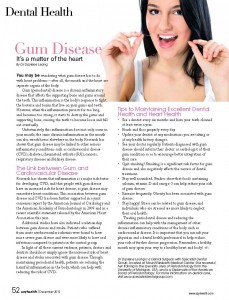 The following article was written by Dr Daylene Leong and appeared in the December 2012 issue of Ezyhealth magazine.
The following article was written by Dr Daylene Leong and appeared in the December 2012 issue of Ezyhealth magazine.
You may be wondering what gum disease has to with heart problems – after all, the mouth and the heart are separate organs of the body. Read on, to find out how your mouth is really the window to your body, and how a healthy mouth can lead to a healthy body.
What is gum disease?
Gum (periodontal) disease is a chronic inflammatory disease that affects the supporting bone and gums around the teeth. This inflammation is the body’s response to fight the bacteria and toxins that live on your gums and teeth. However, when the inflammation persists for too long and becomes too strong, it starts to destroy the gums and supporting bone, causing the teeth to become loose and fall out eventually.
Unfortunately, this inflammation does not only occur in your mouth; the same chronic inflammation in the mouth can also wreak havoc elsewhere in the body. Research has shown that gum disease may be linked to other serious inflammatory conditions such as cardiovascular disease (CVD), diabetes, rheumatoid arthritis (RA), cancers, respiratory diseases and kidney disease.
The Link between Gum and Cardiovascular Disease
Research has shown that inflammation is a major risk factor for developing CVD, and that people with gum disease have an increased risk for heart disease as gum disease may exacerbate heart conditions. This association between gum disease and CVD has been further supported in a joint consensus report by the American Journal of Cardiology and the American Academy of Periodontology in 2009 and in a recent scientific statement released by the American Heart Association this year.
Additional studies have also indicated a relationship between gum disease and stroke. Patients who suffered from acute cerebrovascular ischemia were found to have more severe gum disease and were more likely to have oral infections compared to patients in the control group.
In light of all these current evidence, patients, doctors and dentists should not simply ignore the increased risk of heart disease and stroke associated with gum disease. Through maintaining periodontal health, patients are reducing the harmful inflammation in the body, which can help with reducing the risk of CVD.
Tips to maintaining Excellent Dental Health and Heart Health
- See a dentist every 6 months and have your teeth cleaned at least twice a year.
- Brush and floss properly every day.
- Update your dentist of any medications you are taking or of any health history changes.
- See your doctor regularly. Patients diagnosed with gum disease should inform their doctor or cardiologist of their gum condition so as to encourage better integration of their care.
- Quit smoking! Smoking is a significant risk factor for gum disease and also negatively affects the success of dental treatment.
- Stay well nourished. Studies show that foods containing calcium, vitamin D and omega-3 can help reduce your risk of gum disease.
- Exercise frequently. Obesity has been associated with gum disease, and exercising to maintain a healthy weight can help lower the risk of severe gum disease.
- Stay happy! Stress can be related to gum disease, and individuals who are stressed are more likely to neglect their oral health.
Treating periodontal disease and reducing the inflammation can help with the management of other chronic inflammatory conditions of the body such as cardiovascular disease. It is important that you consult your physician and a dental health professional, such as a periodontist, to help reduce your risk of further disease progression. Remember, a healthy mouth may open your way to a healthy heart and body!
Dr Daylene Leong is a Dental Surgeon with Specialist Dental Group, Singapore. She received her training in the specialty area of Periodontology from the University of Michigan, USA and is a Diplomate of the American Board of Periodontology. For more information on dental care, visit www.specialistdentalgroup.com.
Source: Straits Times © Singapore Press Holdings Limited. Reproduced with permission





